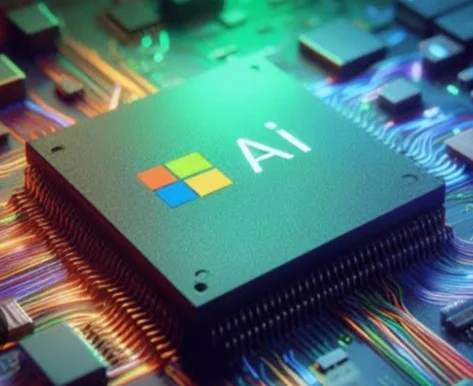Microsoft AI is not just a buzzword or a marketing slogan.
It's a powerhouse driving innovation across diverse sectors, from empowering businesses with Azure AI tools to revolutionizing healthcare with AI-powered diagnostics.
Microsoft AI Products and Services
| Product/Service | Description | Key Features |
|---|---|---|
| Azure AI Services | A cloud-based platform for building and deploying AI applications. | Custom Vision, Text Analytics, Speech-to-Text, Translator, Face API, and more. |
| Microsoft 365 Copilot | An AI-powered assistant integrated into Microsoft 365 apps. | Natural language processing, content generation, and task automation. |
| Power BI | A business intelligence platform with AI capabilities. | Natural language queries, automated insights, and predictive analytics. |
| Azure Machine Learning | A cloud-based platform for building, training, and deploying machine learning models. | Automated ML, model management, and deployment. |
| Dynamics 365 AI | AI-powered capabilities within Dynamics 365 applications. | Sales Insights, Customer Insights, and Customer Service Insights. |
| Microsoft Cognitive Services | A set of APIs for building intelligent applications. | Vision, Speech, Language, Knowledge, and Search. |
| Azure Bot Service | A platform for building and deploying conversational AI bots. | Natural language understanding, dialog management, and integration with other services. |
| Microsoft HoloLens | A mixed reality headset with AI capabilities. | Spatial mapping, object recognition, and gesture recognition. |
| Project xCloud | A cloud gaming service with AI-powered features. | Latency reduction, adaptive streaming, and personalized recommendations. |
Note: This is a partial list of Microsoft AI products and services. Microsoft is constantly expanding its AI offerings, so there may be additional options available.
Let's peel back the layers and explore the magic beneath the surface:
1. Beyond the Cloud: A Spectrum of Solutions:
While Azure might be the first thing that comes to mind, Microsoft AI extends far beyond cloud services. It encompasses:
- AI research: Cutting-edge research labs like Microsoft Research delve into areas like natural language processing, computer vision, and reinforcement learning, pushing the boundaries of what machines can achieve.
- AI products and services: Azure Cognitive Services offers pre-built AI tools for developers, while platforms like Azure Machine Learning empower businesses to build and deploy their own custom AI solutions.
- Industry-specific solutions: Microsoft AI tackles real-world challenges in healthcare, finance, retail, and more, with projects like Project InnerEye for medical image analysis and Dynamics 365 for intelligent business applications.
2. Democratizing AI for Everyone:
Microsoft AI doesn't just cater to tech giants. Its mission is to democratize AI, making it accessible to everyone:
- Low-code/no-code tools: Tools like Power BI and PowerApps allow users with minimal technical expertise to build AI-powered solutions, empowering citizen developers and analysts.
- Focus on explainability and transparency: Microsoft AI prioritizes building explainable and transparent AI systems, ensuring users understand how AI decisions are made, fostering trust and responsible development.
- Supporting responsible AI practices: Microsoft advocates for ethical AI development through initiatives like the Responsible AI Framework and partnerships with organizations like the Partnership on AI.
3. Real-World Impact: From Productivity to Healthcare:
Microsoft AI's impact extends beyond theoretical research.
Here are some concrete examples:
- Boosting business productivity: AI-powered tools in Microsoft Office 365 automate tasks, personalize workflows, and improve decision-making, leading to increased efficiency and cost savings.
- Transforming healthcare: AI algorithms analyze medical images to detect diseases like cancer earlier and with greater accuracy, impacting patient care and outcomes.
- Enhancing accessibility: AI tools like Seeing AI narrate the world for visually impaired individuals, while Project Emma develops intelligent communication technologies for people with complex disabilities.
4. The Road Ahead: Building a Responsible Future:
As Microsoft AI continues to evolve, its focus remains on responsible development and positive impact:
- Addressing bias and fairness: Microsoft actively tackles bias in AI algorithms, working to ensure AI systems are fair and inclusive for all.
- Protecting privacy and security: Strong data security measures and privacy-preserving techniques are core principles in Microsoft AI development.
- Collaborating for greater good: Microsoft partners with academics, researchers, and organizations worldwide to ensure AI benefits all of humanity, not just a select few.
The Takeaway:
Microsoft AI is not just a technological marvel; it's a force for progress. By democratizing AI, tackling real-world challenges, and prioritizing responsible development,
Microsoft AI is shaping a future where intelligence empowers individuals, businesses, and society as a whole. Stay curious, explore specific areas of Microsoft AI that pique your interest, and join the conversation about shaping a responsible and beneficial future for AI!


